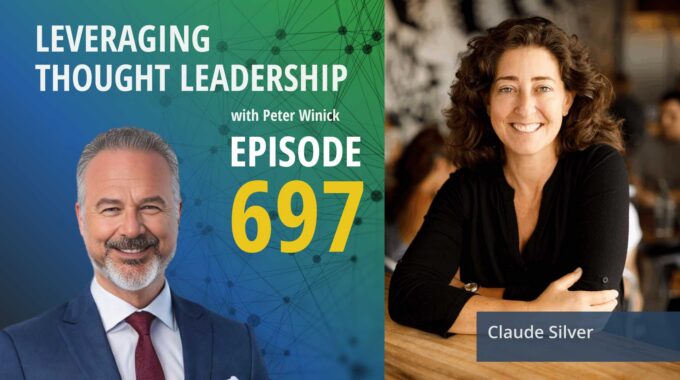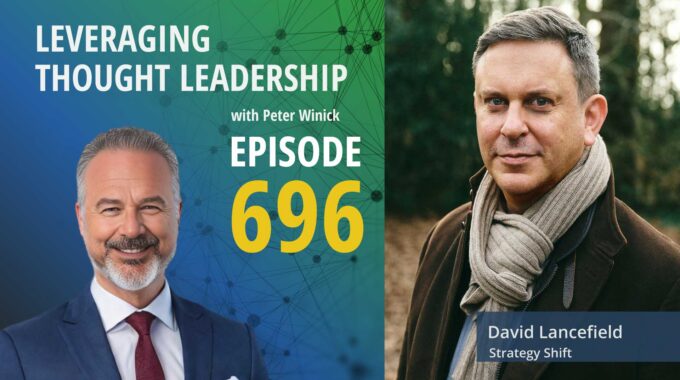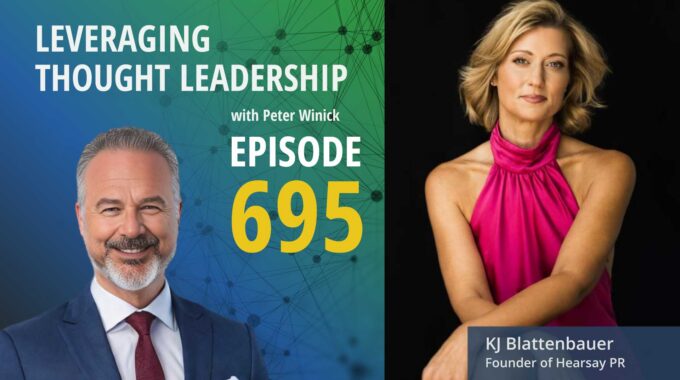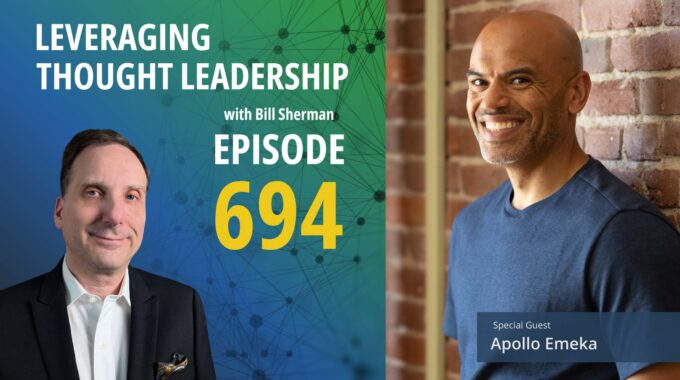Frameworks for connection, accountability, and performance This episode examines how psychological safety drives performance, how…
Thought Leader Brand Building | Brian Smith
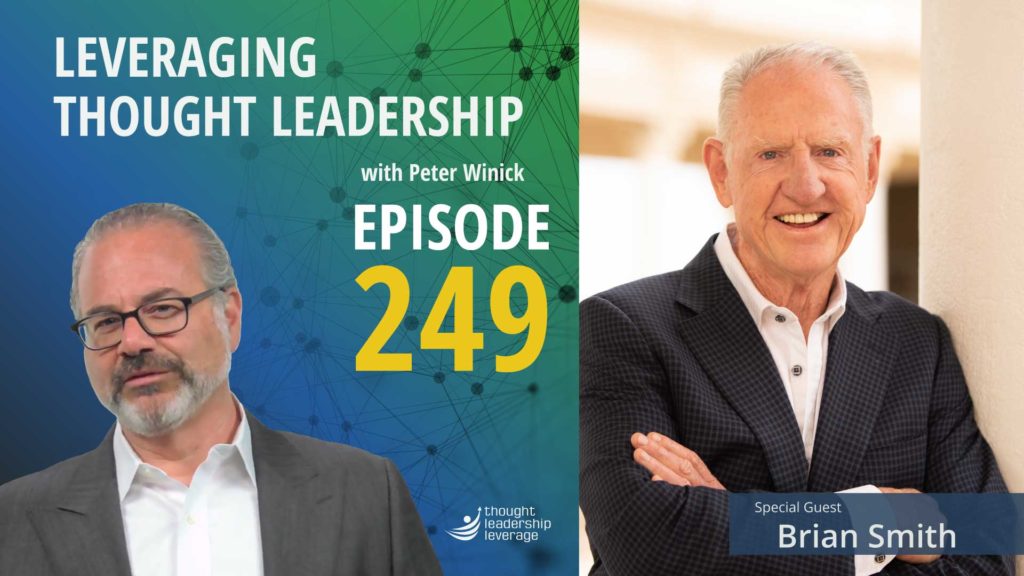
Building a thought leadership brand
An interview with Brian Smith on building the UGG brand, writing The Birth of a Brand, and speaking pre and post COVID-19.
Today’s guest is Brian Smith, the Founder of UGG, a company started on shores of Southern California that would become a globally recognized brand. He is the author of The Birth of a Brand, and one of the most sought after speakers and business leaders in the country.
Brian tells the tale of starting UGG and eventually selling it in the late 90s. Then, Brian talks about writing The Birth of a Brand during the recession from years of notes on building UGG. Afterwards, he explains how he became a keynote speaker using many of the themes from the book.
We discuss the speaking business as it existed prior to the global pandemic and how speakers are continuing to work without being able to travel.
If you are a speaker concerned about the future of your industry, this episode has great insights into speaking during COVID-19. In addition, we delve into what the future of speaking might look like, and why being social will always be a key to successful speaking.
Three Key Takeaways from the Interview:
- How thought leaders can take one modality and use it in different formats.
- What stages a thought leader can expect their business go to through and how they compare to stages of life.
- What keynote speaking for thought leaders looks like now and might look like in the future.
If you are birthing a brand for your thought leadership and need help with a marketing strategy for your evergreen content, Thought Leadership Leverage can assist you in accomplishing your thought leader brand building.
Transcript
Peter Winick Welcome, welcome, welcome. This is Peter Winick. I’m the founder and CEO of Thought Leadership Leverage. And you’re joining us on the podcast. Leveraging Thought Leadership Today I’m really excited. My guest is a gentleman by the name of Brian Smith. He’s a founder of a little company that you may recognize or may have on your feet called UGG Australia Brand. He graduated in 1978 as a chartered accountant in Australia, then came to California and with only $500 in capital, he imported boot samples and over the next 17 years built the Australia brand into a multi-million dollar brand. He sold it in 95 and it’s now a multi billion dollar company. He’s the author of a book, The Birth of a Brand Launching Your Entrepreneurial Passion in Seoul and is a keynote speaker and does a lot of work with entrepreneurs and small businesses. So I am delighted to have you on board today. As we as we’ve chatted, you’re a big fan. So welcome aboard today.
Brian Smith Hey, Peter, Thanks for having me.
Peter Winick Yes. So. I think let’s do this in two ways. First, let’s pretend the world was still normal and we weren’t, you know, a lockdown in our homes. And tell us a little bit about how you got into this side of it. Right. So the keynote in the speaking, the working with entrepreneurs. Right. So how did how did that evolve your post dog days.
Brian Smith Okay was it was almost osmosis after I saw dog in the late 90s I started a precast concrete wall delivery business. They did fantastic. We put up over 100 structures in four years in Southern California for the military. And then in 2009 the recession hit. A construction orders stopped like overnight. And so I had kept notes all through the year, 18 years it was. And we’re building that brand. But I I’d see something and I said, that’d be great in a book one day, you know, And I do that with a little one inch binder that grew to like a three inch binder. And I when the recession hit, I said, you know, I got this dead time. What can I do? So I pulled out all those notes and rearranged them, and that became the basis of the birth of a brand, which is so.
Peter Winick So let me pause you there for a minute, because I think there are some parallels to what’s going on in the world today, although the crisis in eight, nine, looking back was probably a hiccup compared to what we’re experiencing will experience day to day.
Brian Smith Because if you’re right.
Peter Winick Yeah hopefully I’m wrong but it seems like we don’t know yet but I find so many folks like you that during times of trouble, recession, you know, the economy stinks. Whatever, whatever, whatever. It’s a time where great creativity happens, Right? So you were documenting these little nuggets, these little thoughts, and you always had the concept of, yes, one day I will write a book. But it was never in the third quarter of this year. So now you say you.
Brian Smith Never had a deadline to.
Peter Winick So now you say, well, geez, I got all this time on my hands, what the hell? Right? So I think there’s a lot of that happening now, quite frankly. I’ve heard from.
Brian Smith Friends and myself. We can talk about that later. But just to finish how I got into it, I ended up writing the book. It was very easy because I know my daily plan is for like 20 years since I arrived in America. So it was a good cheat sheet for me and the book. When I got close to finishing, I went to seminars on how to publish a book, and I was in the lunch line at one of these seminars, and the girl in front of me stood and asked what I did, and I said, I’m just finishing up a book on target. And she said, Well, do you want to speak on the stage? And I said, I’m not a speaker. And she said, Well, I’m going to write in two weeks, You know, Would you like to speak at that? And I just said, yes, you know, okay. Never having ever wanted to be a speaker. I didn’t even know that was part of the deal with the book.
Peter Winick But let me pause you there, Brian, because, you know, it’s interesting. There are very, very, very few people that I speak with that move into the speaking world that had a very deliberate, linear approach. Right? It’s usually something serendipitous like yours where somebody says, Hey, would you like to dot, dot, dot? You go, okay. And then you fast forward and it’s like, I do that 50 times a year. Now isn’t that interesting?
Brian Smith That’s funny. So I had two weeks and luckily I had a friend who used to work with Tony Robbins. You know, she was one of the person. Yes. She said, well, you need, you know, a beginning and an end and a couple of 3 or 4 stories, you know. And so I, I can do that. So I just, you know, pulled stuff out of my book and did my first talk. And everyone was really sympathetic for me. You know, they stood up and gave me a standing ovation. But it was a pretty good speech anyway. Yeah, but not technically, but the content and the delivery was so heartfelt and I was just telling her stories and that’s when I realized that, you know, the best speakers, a storytellers. And so.
Peter Winick Absolutely.
Brian Smith Over the years I probably did it about 6 or 7 years. And overall, I really developed it into a really tight set of stories, but also have a really strong mission to help people in the audience. You know, with his appearance, the practicalities of life and their business, especially geared for new entrepreneurs. Even though I speak to entrepreneurs, I can also speak at YPO, where you got seasoned veteran, you know, CEOs, and they come up afterwards and go, my God, Brian, you brought back so many memories for me, you know, So that’s.
Peter Winick So let me ask you. So those are two quite different audiences. The classic on. Brenner Yeah, and the YPO person, you know, are about $5,000 million companies or something. What is it, the commonality of the resonance. So for, for both of those groups, because their days look very different.
Brian Smith Not totally yet. Well, for the entrepreneurs starting out, it’s like a roadmap and it’s sort of a here’s what you’re going to encounter. And many of them, like the theme of the book, is that you can’t give birth to adults. And that’s the theme I came up with after watching businesses for so long. Every business starts with conception, and then the first action, which is like me buying six pairs of samples, was the birth of Bach, right? Right, Right. And then every business or service goes into this horrible infancy and it just lies. There lies there, and there’s no amount of yelling at it or speeding out of the cradle. An infant can’t get up and go to college, you know. Right. But then it’ll start toddling if you stick with it. And that’s when the first customers are coming in and people are writing magazine articles about you. And that’ll quickly go into the youth phase, which is consistent orders, consistent production, accounting and sales is all work and fantasy. You can run a $2,030 million business in that year, but if it’s a really, really good product or service, you’re going to hit the teenage years and that’s when you know you want to be in every party in town as a teenager will write business. You want to be in every trade show and you want to be in every mass retailer. And it’s really easy to strip your capital out and go broke, you know? So. So that was a theme of the book. And that’s really when I talk to the new entrepreneurs they’re picking up on, look what I got to go through. Yeah, the seasoned veterans are going, shit, that was a great talk. Thanks for reminding me of all the shit that I went through.
Peter Winick So it’s look forward versus look back. So I can’t wait to be a teenager and do all that. And the other ones are looking back. God, was I silly, right? God, did I do something?
Brian Smith And because I pulled out stories from the book that the stories are really what keeps everybody really interested.
Peter Winick Excellent. So. Now in a stage of transition, right. Just in general in the world. And I think given that most of your work has been on the keynote side of late. Right. Part of what we’re seeing is people go, you know, there’s a couple of different reactions people are having. One is, my, my. You know, the sky is falling in the sky is falling, The sky is falling. The sky fell. Period. So to me, it’s about really thinking about, okay, well, what if I decompose the value proposition of the keynoter, Right? You’ve got information, you’ve got content, you’ve got stories, you’ve got an audience that it resonates with. And then you had a modality to deliver that by. So assuming that what you have is still valuable, that hasn’t changed and assuming that the audience is still there. Right. And it might be a different audience. It might be a new audience, It might be a subset of the audience that you’ve worked with in the past. What are your some initial thoughts on treatment thinking about this as of late as to alternatives to the modality, given that it’s not really.
Brian Smith Already what we’ve been in this couple of months? Right. I had two big bookings in Australia about 2 to 3 weeks ago and believe it or not, I was in the departure lounge in L.A. when my sister called from Australia and said The Prime Minister just announced If you arrive after midnight is 14 days quarantine. So, so I got my bag off the plane and stayed here and I just assumed I’d lost those two talks. Well, what happened over the next week was that they decided to go online and still hold the conferences. And the first one was a big regional event for EOH, and I ended up with a program they sent me called Liam, and it’s an Australian site, sort of like Zoom, but I had my PowerPoint on it and give my keynote with my PowerPoint. It was a brilliant program and I prerecorded that and sent it down. They played it like they still had the three days of their conference, but it was all from home and they played me at exactly the right time. I would have been speaking and we’d organized another interview where I had to wear the same clothes in the same way and look like he came and talk to me. Right, Right. So and that went flawlessly. And I mean, you should have seen the results. You know what I got from all of the comments from the from the show. So there’s a perfect instance where we had 2400 people that were supposed to be like that now became 2400 people online. And I gave exactly the same talk and did the same sort of Q&A afterwards. But the because the their organization went into a lot of expense. So I ended up cutting the fee quite a bit. And I don’t see that these online conferences are going to be very valuable to big speakers any more.
Peter Winick If you’re enjoying this episode of Leveraging Thought Leadership, please make sure to subscribe. If you’d like to help spread the word about our podcast, please leave us a review and share it with your friends. We’re available on Apple podcast and on all major listening apps as well as at ThoughtLeadershipLeverage.com/podcasts.
Peter Winick So I think that’s right. Yes. And I think here’s the big if. If all you’re doing is delivering because let’s go back read and a half a step. So speaking has always been a transactional thing. It’s an event based thing, right? It’s someone whoever hires you is going to put a bunch of people in a room for some period of time and you’ve got an hour to do your thing. Be engaging, be entertaining, tell the stories, pop some seeds into their head. Right. And that has a value proposition. Yeah. So now I think what’s going to happen is we’re going to have a flood in the marketplace of digital, you know, people going on digital and saying, well, geez, I’ll do it for $0.20 on the dollar of what I used to fly because I think we’re the war is going to be one is people thinking, well, you know, forget these transactions. What is a learning experience that we can go through together? And there might be some pre-work, there might be some things we do in real time. There might be some ongoing learnings and reconfiguring and just going back to the drawing board and thinking about what that experience is, because I think we’ve all been thrown into the pool saying, here’s all these new technologies figure out, and some have been good at it prior to this and some haven’t. And now you’re seeing the uptake and the upgrade of people being fluent in Zoom and all these technologies.
Brian Smith But there’s so many, so many instant seminars, you know, like read daily radio shows, you know?
Peter Winick Yeah, yeah, yeah, yeah.
Brian Smith I get drowned with it. Yeah.
Peter Winick Well, in the technology is in a more stable place than it’s been. But I think that people are just going to have to rethink. The experiential, right? So the traditional keynote of, you know, someone introduces you, there’s probably some music, there’s probably some visuals. There’s a there’s a visceral something. You can also sense a room and say, these, you know, it’s the second date of the conference. They’re all hung over. Maybe take it down a notch or, or, or that young lady in the third row is dying to get a question out. I can’t wait to talk to her or whatever. You’re going to have to change some of your skill sets as well to adapt to delivering value when we’re not together.
Brian Smith Yes, the thing that I’m afraid of is that there are lots of organizations with chapters all over the world and it’s been a quite a good business going and speaking to all these chapters.
Peter Winick Yes.
Brian Smith And now one of those groups, which is a very big one, has asked if I could come and do it live online. And my question was, well, is this going out to the entire membership or is this going is it I don’t want to put my whole keynote out on on YouTube.
Peter Winick Right.
Brian Smith Right. Download it. It’s like, that’s a proprietary thing. It’s taken me years to build your.
Peter Winick Intellectual property, right? Yeah. And so Well, and the chapter model was has always been typically based on geography. I’m in Denver, so all the entrepreneurs in Denver. But now from reading online, does it matter where I am? Right. So that might blow up the chapter model a bit.
Brian Smith Yeah. So it’s but you know when I think in time the reason these chapters developed is because they there’s a real place for people getting together and socializing, drinking beer, having food, listening to a speaker. There’s a sense of camaraderie. And that’s what brings that’s what’s kept these chapters together, is the human side of it, right?
Peter Winick Well, I think what’s interesting about that, Brian, is this this this community piece, right? Because you have content and you have community and so content, you could do the same speech in Denver and Cleveland and, you know, Melbourne or whatever with this community piece. One of the things that we’re seeing really, really early on in this crisis is people recreating community. So using Zoom to have a virtual cocktail hour, we miss seeing our friends and we can’t you know, we’re missing the touch. But you know, what can we do? It doesn’t always have to be business. We can just get on. And, you know, I saw there was I haven’t used to get a plug in for Netflix or a bunch of friends could watch the same movie at the same time.
Brian Smith Yeah.
Peter Winick And chat. So there is a human need for connection. You restricted, you know, you pull away the physical. We have tools to do that, right? So, you know, this is a richer experience that you and I are talking and I can see your face and you can see mine video. And I think we’re learning to adapt to that. It won’t replace but it’s…
Brian Smith Yeah, you know, the world is the world is changing so fast. I mean, ever since I was born, the world’s been changing fast. Right? I remember reading a book called Psycho Cybernetics that was saying that it was doubling the amount of information was doubling, like every year and getting halving every year. Right. Well, yeah, that’s played itself out for sure. And I was yesterday hanging out with my granddaughter who’s two years old, and she can navigate kids Netflix and she can select which movie she wants to watch. She can stop him. If she’s bored, she can go now, that’s this.
Peter Winick I might need to call her because I have a trouble with that. Can I can I call?
Brian Smith So that skill set is sort of innate to her growing up. That’s natural for her. Yeah. I wonder where the future is going to be with this whole community getting together for physical meetups, you know? But I’m also enough of a believer in humanity that there’s a definite need for humans to want other human interaction to go basis. And you’ll never replace that on a on a TV screen or a computer monitor. And I think it’s just a matter of time for this scared of, you know, if fear itself out. I mean, I was way more scared of Aids than I am of Covid 19. Really, Right? Yeah. Terrified me. But it was again, because of the fear. The fear was just intense with Aids, the hate exclusion ism. You know, it was a horrible period. And this is very similar, but, you know, it’ll blow over and.
Peter Winick Well, it’s opposed to Aids, but this is universal. So it’s not.
Brian Smith Exactly you.
Peter Winick Can’t ostracize a group and blame them and do all those horrible you know.
Brian Smith That’s what the media’s trying.
Peter Winick Yeah, well, they try as they will. Right, Right. So really interesting. So as we start to wrap, if there was someone out there now that was a similar experience to you when you started in the speaking world 20, 20 some odd years ago, what what words of wisdom? What advice would you give them?
Brian Smith Well, you have to have a reason for doing it. You know, I had a friend ask. Is it money or is it fame? Right. So if you just want the fame, then just get on every damn podcast you can in every stage you can. And don’t worry about not getting paid. And you can be as famous as you want to be. But if you want to, like I look at speaking as a business and it’s not an easy business and it’s, you know, you can’t give birth to adults. I’ve had to go through the infancy and the birth of that, and it’s a grueling 2 or 3 years to figure out just how all these organizations work and how what meeting planners are looking for. You know, all these things. Getting your story as right is the easiest part.
Peter Winick It’s the well, the stage work. So let’s separate that because most people and I don’t want to under value the power of great stage work. It’s kind of the easy part. Right. So the business side of it really understanding I have a product, it’s a speech I sell to these type of people that are looking for these type of outcomes. How do I serve them? Which is different than the butts in the seats, listening to the experience, Totally different. And I think those that are truly successful are masters at both, because I’ve seen some folks that are amazing speakers, but they’re horrific on the business side because they just they don’t get it. They don’t it’s not how they’re wired. And then you have others that are really good on the business side and maybe mediocre on the stage. And I hear that. And so when.
Brian Smith I when I started out, I had no idea of the business side, but really, it took 2 to 3 years to start to figure that out and be able to have a plan on who are who, who do I serve, who don’t, who’s the king, who’s the gatekeeper and how do I get in? And then how do I get paid? And those three things a very, very highly business oriented.
Peter Winick Well, they’re changing all the time. All the.
Brian Smith Time. Yeah.
Peter Winick Well, I appreciate your time, Brian. I love the story. Love the eggs. Love your story.
Brian Smith Yeah, Thanks. It’s been great.
Peter Winick And good luck. And stay safe. Thank you.
Brian Smith Good luck to all your speakers out there. It’s interesting times.
Peter Winick To learn more about Thought Leadership Leverage, please visit our website at ThoughtLeadershipLeverage.com. To reach me directly. Feel free to email me at Peter at ThoughtLeadershipLeverage.com. And please subscribe to Leveraging Thought Leadership on iTunes or your favorite podcast app to get your weekly episode automatically.


